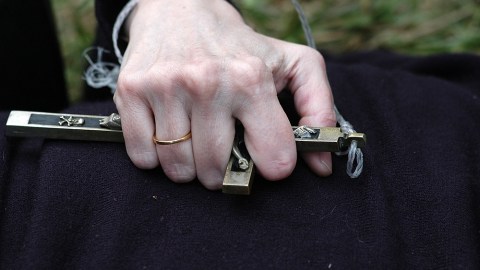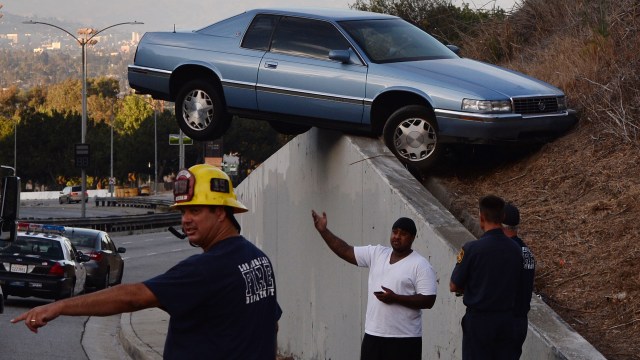A Defense of Legalizing the Right to Assisted Suicide

For the January/February 2016 cover story of Mother Jones, columnist Kevin Drum investigates a growing movement advocating for the legalization of assisted suicide. This particular story is personal to the longtime political writer: he watched his father-in-law, a retired physician, fall ill due to multiple myeloma. Having watched many patients die over his decades of practice, the retired doctor knew he only had one choice.
As a California resident in 2009, however, he was not empowered with the decision to take his own life. He could not foresee spending the final years of his existence in excruciating pain dependent upon others, or worse, on life support. He wrote a note assuring governing bodies that no one aided in his suicide, went into his bedroom, flipped on a tank of helium, and placed a plastic bag over his head.
We all hope to slip quietly in the night, but for many reality is not so kind. You often hear how wonderful modernity is given our greatly increased life expectancy rates, but those data are skewed: antibiotics and other pharmaceuticals have helped infant mortality rates dramatically decrease, and humans have long lived into their seventies and beyond. The problem is that today many seniors—too many, perhaps—are kept alive thanks to a chemical cocktail keeping their vital organs functioning while doing nothing for quality of life. And in forty-five states you have no legal means of doing anything about it.
Things are changing in California. Last October Governor Jerry Brown signed into law the End of Life Option Act, which will go into effect sometime within the next year. Activists cheered while the religious revolted: the Catholic organization Providence Health & Services, for one, promised that in no way would they offer assisted suicide. Numerous other talking heads have offered biblical fury for such transgression.
This ruling could be especially relevant for Drum, a California resident that found out he too has multiple myeloma in 2014. While he has mostly recovered there are still worrisome markers. Mortality always reminds us of his presence. Drum knows that this cancer of the bone marrow can go in many directions. If it assaults he’ll be dead in weeks. And if that happens, he realizes that he must face the same decision his father-in-law did seven years ago.
The right to commit suicide has always been a religious issue—rather, the religious have always made an issue of what people do with their lives. While not as hot a topic as abortion, religious leaders are very concerned with the beginning and end stages of life regardless of circumstances. One of the more troubling heads of this Hydra is the fundamentalist demand that even victims of rape must bear their baby as that too is part of “God’s plan.”
Strange architect, he who would be so unforgiving while also enabling us with plenty of means of taking our own life should we so choose. Reasons for such a decision are numerous: the late psychologist James Hillman covered this subject over four decades ago, speculating on the psychiatric reasons a human being is pulled toward self-inflicted death; more recent neurological research has shown that humans suffer a variety of ailments in regards to their existence, such as wanting to cut off a limb they do not view as their own. Turning a blind eye to the many nuances of neurochemistry does not help anyone.
Nor does demanding a human being live their final moments in unbelievable misery. Susan Jacoby writes about the Supreme Court judges that voted to overturn Oregon’s assisted suicide measures even though citizens affirmed this decision three separate times. The late justice Antonin Scalia went so far as to claim that Catholic officeholders should resign if their public office required them to perform duties opposed to church doctrine. Fortunately more rational justices prevailed in this case; Oregon has been a haven for those who recognize when it’s time to move on.
A recent episode of VICE entertains the more questionable aspects of assisted suicide. Brown’s California measure is carefully worded to ensure that the patient must be facing an impossible recovery. This has proven to not always be the case in other countries, where those interested in suicide for emotional problems have received their wish, a main point of contention by religious organizations.
But this begs a question: Why should anyone other than you be responsible for what you do with your life? We have no serious sanctions, religious, social, or political, in place for people smoking or eating themselves to death. The many tragic consequences of sugar overload have long been documented, but you will not find activists discussing the sanctity of life in either case (though, to be fair, some religions, such as Mormonism and Islam, do require abstention from certain substances). The fact is many humans die slowly and painfully from poor health choices. A person suffering from psychological malaise is immediately off limits, however.
The irony that many religious activists want the government to be hands off except when it comes to issues regarding faith harms those that are simply trying to make their way the best they can through this existence. If that means life is affected on one end or the other, that should be of no concern to those who oppose such measures for themselves. (A fitting meme: If you don’t like gay marriage, don’t get gay married.)
Yes, treatment and counseling for those suffering from neurological issues and chemical imbalances should be a first option. For those without such an option, however, life is theirs to live and end how they see fit. Let’s hope the rest of the nation recognizes this. The longer it takes, the more unnecessary suffering this outdated restriction creates.
Image: Tim Boyles / Getty Images
—
Derek Beres is a Los Angeles-based author, music producer, and veteran yoga/fitness instructor at Equinox. Stay in touch @derekberes.





